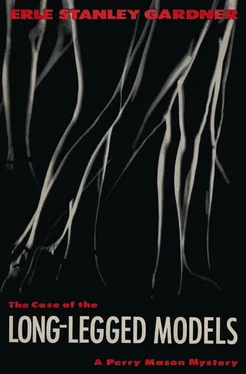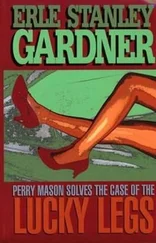“I wouldn’t want you to,” Mason said. “Come on along.”
“What do you have in mind? Are you going to ask me to make some sort of a statement or...”
Mason said, “I want you to keep your mouth shut. I want you to listen. If you feel like it you can nod your head.”
“And if I don’t feel like it?”
“Just stand there and take it.”
Garvin said, “Mason, I hope you know what you’re doing.”
“I hope I do, too,” Mason told him, “and we haven’t much time to do it. Now let’s get started.”
Mason led the way into the apartment house, up to Stephanie Falkner’s apartment. The lawyer tapped on the door of the apartment. There was the rustle of motion from the other side of the door, then the door opened a crack.
“Who is it?” Stephanie Falkner asked.
She saw Mason and said, “Oh, Mr. Mason!” She threw the door open, then her eyes widened as she saw Homer Garvin, Jr. standing just behind Mason.
“Now get this straight, Stephanie,” Homer Garvin said. “Whatever this is all about, it’s Mr. Mason’s idea. None of it is mine.”
“Shut up,” Mason told him. “Come in. Keep quiet!”
Stephanie Falkner fell back. Mason escorted Garvin into the apartment, kicked the door shut behind him.
“Congratulations, Homer!” Stephanie said.
“Shut up, both of you,” Mason snapped. “We don’t have much time. Stephanie, Homer Garvin has been concerned about your safety. Despite his recent marriage, you remain a very dear friend. In view of what happened to your father and because he has learned through me that negotiations are again pending with what is probably the same syndicate, he feels that you should have something for your protection.”
“For her protection?” Garvin asked.
“Shut up,” Mason said. “Give her the gun.”
Garvin hesitated a moment, then reached in his pocket and pulled out the gun.
“Take it, Stephanie,” Mason said.
“What do I do with it?”
“You might try putting it under the pillow,” Mason told her.
Garvin said, “One shot has been fired. Mr. Mason—”
“Quiet!” Mason said. “You told me you didn’t intend to say anything and now you want to do all the talking.”
“Stephanie, Homer Garvin is very much concerned about your safety. He wants you to have a weapon so that you can protect yourself. There is no secret about this. There’s no reason for any deception. If anyone asks you where you got the gun, you can tell them that it is a gun you received from Homer Garvin, and conversely if anyone asks you where the gun is you got from Homer Garvin there is no reason why you shouldn’t hand over this gun.
“You will note that one shot has been discharged from this weapon. That was the condition of the weapon when it was given to you. You have no idea as to who discharged the cartridge, where or when. If anyone wants to know the answer to those questions, it will be necessary for them to check with Homer Garvin.
“Thank you very much for your courteous attention and I think it was a splendid gesture on the part of Mr. Garvin to see that you were protected.
“That’s all. Come on, Homer.”
Mason opened the door of the apartment. Stephanie Falkner regarded them with puzzled eyes. The gun lay on the table in the middle of the room.
Homer Garvin said, “I’d have told you about it before you read it in the papers, Stephanie, only I—”
“You don’t have to explain, Homer,” she said. “I understand perhaps a lot more than you think. I understand your restless nature, your ceaseless attempt to make over your environment. After all, there’s no reason why we can’t be friends.”
Homer pushed past Mason, stepped forward and extended his hand. The two shook hands.
Mason, holding the door of the apartment open, said, “Homer Garvin, if you don’t get out of here, I’ll call a taxi and ride back in that.”
“That does it, honey,” Homer Garvin said. “I’m selling the sucker a car.”
“More power to you,” Stephanie Falkner said, and then added, “You may need it.”
Garvin stepped into the hall, and Mason shut the door of the apartment.
They took the elevator to the ground floor and were starting across the lobby when Mason suddenly grabbed Garvin’s arm and said, “This way, please.”
Mason led Garvin over to the seats by a table covered with reading matter. He grabbed a magazine, pushed Garvin down on the seat, shoved the magazine in his hands, picked up a newspaper and sat down beside him.
The door of the apartment house opened.
Lt. Tragg of the Homicide Squad, accompanied by Sgt. Holcomb and the taxi driver who had driven Mason earlier in the morning approached the desk. They talked briefly with the attendant, then entered the elevator.
“All right,” Mason said, “let’s go, and let’s hope they didn’t notice that sports car in front.”
“What the hell do you mean, didn’t notice it?” Garvin said. “That’s like suggesting a banker doesn’t notice the steam Calliope in a circus parade as it goes by during a directors’ meeting.”
“That,” Mason said, “is what I’m afraid of. If you’re going to do business with me on an automobile, you’ll have to get something dark, quiet, and conservative.”
“I have just the thing for you,” Garvin said.
“What is it?”
“A secondhand hearse. It’s only had one owner.”
At two-fifteen the telephone in Mason’s private office rang and Della Street said, “Marie Barlow is on the phone, says it’s rather urgent.”
Mason nodded, took the telephone, said, “Hello, Marie. This is Perry Mason.”
“Oh, Mr. Mason, I’m so glad I caught you. Two officers of the Homicide Squad are here, Lt. Tragg and Sgt. Holcomb. They have a search warrant authorizing them to search Mr. Garvin’s office for bloodstains, blood-stained garments, or other evidentiary matters in connection with the perpetration of a homicide in connection with the death of one George Casselman. What do I do?”
“Dust off the chairs,” Mason said. “Invite them to make themselves at home. Tell them to search all they damn please. Have them give you an inventory of anything they take from the office. Give Sgt. Holcomb my compliments, and ask him to try to refrain from leaving burning cigarettes on the office tables and desks so they leave burnt smudges.”
“That should do it,” she said.
“That will do it,” Mason told her. “Telephone me when they leave.”
Mason hung up the phone, said to Della Street, “Well, here’s where trouble starts. I’m going down the hall to see Paul Drake. Call me there if anything breaks.”
Mason walked down the corridor, pushed open the door of the entrance office on which a sign read “DRAKE DETECTIVE AGENCY.” He said to the receptionist, “Paul in?”
She nodded.
“Busy?”
“No. Mr. Mason. Go right on down. Want me to announce you?”
“No need unless there’s someone with him.”
“He’s alone.”
Mason pushed open the gate which led to a corridor flanked by small, cubbyhole offices each just big enough to interview a witness in privacy or where an operative could prepare a typewritten report.
Drake’s office was down at the end of the corridor and was slightly larger, having room for a desk and a couple of extra chairs. Four telephones were arranged in a row on the desk.
Drake was checking a report as Mason pushed open the door.
“Hi, Paul.”
“Hi, Perry.”
“Want a job?”
“Sure.”
“George Casselman.”
“He was murdered last night,” Drake said.
“You keep up on your murders, don’t you?”
Читать дальше












